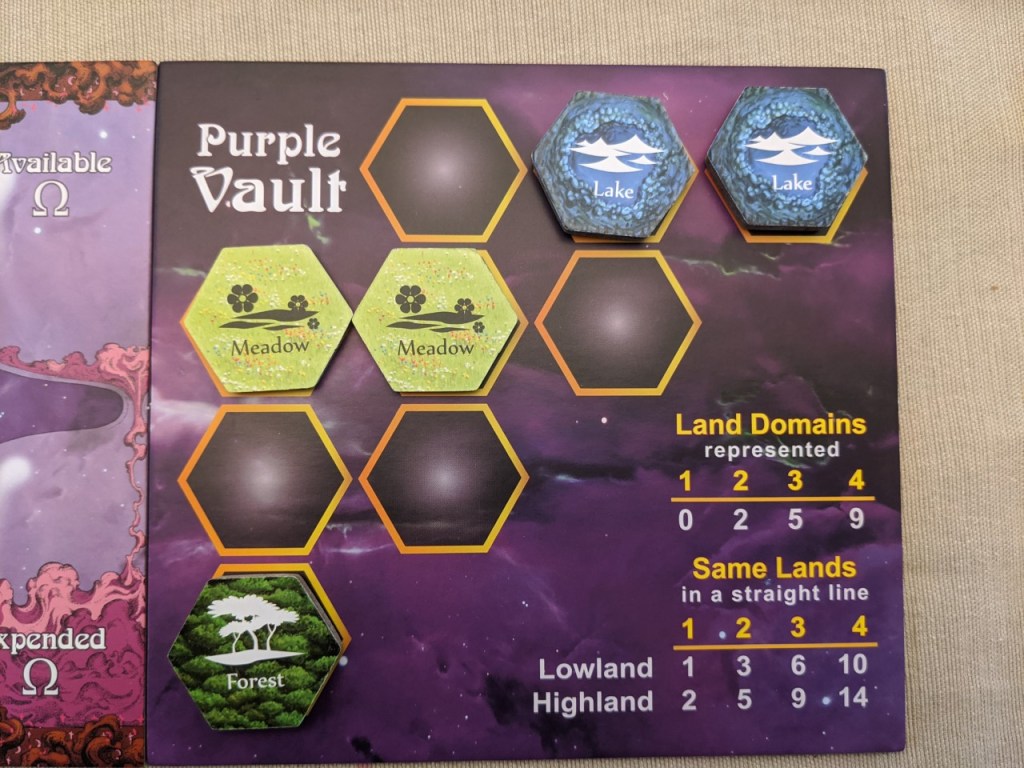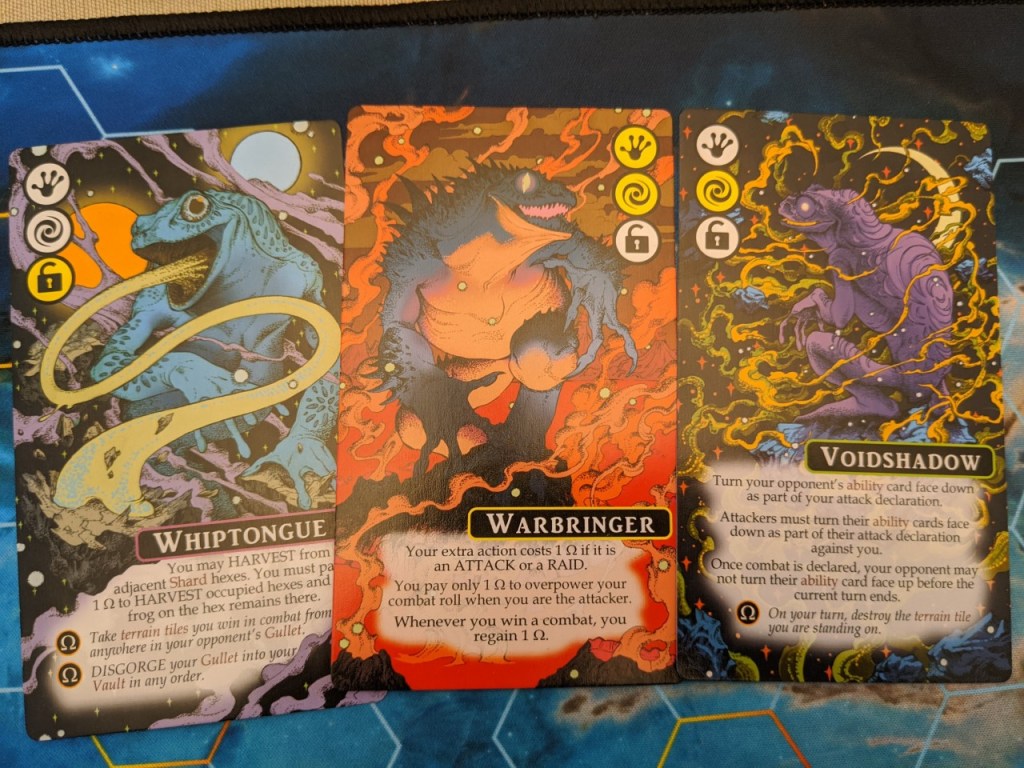Cosmic Frog is out there. Being a Jim Felli/Devious Weasel production, its idiosyncratic setting and theme is altogether expected. In fact I welcome it. I eat it up like a two mile high galactic amphibian shoveling earth into its gullet.

This is a game that totally gets it. It’s empowering, at once realizing the goal of making you feel massive and potent. You’re an enormous interstellar being who swallows geography and then vomits it up into your spectral vault – you damn well better feel powerful.
Represented by a surprisingly detailed toad miniature, players take turns hopping about the oddly shaped board and spending actions to devour the very ground they stand on. The surface of the shard – a tangible concentration of “aeth” – is dotted in different types of geography such as swamps and mountains. The variations matter solely because they form different vectors to score victory points and encourage various arrangements in your vault. Primarily they drive players to different areas of interest on the map and cause natural collisions as you fight for dominance.
Yes, you wouldn’t be cosmic fucking frogs if you didn’t swing your limbs around like empyreal phalli of astral force.

Combat is relatively simple as you’re looking for high results in a dice pool, but detail is embedded by allowing you to boost with the flexible oomph resource. Each player also possesses one of dozens of unique special abilities which potentially alter your combat prowess and offer new tactical considerations.
Let’s take a step back though. Your turn occurs when one of your cards is flipped up from the combined action deck. This mechanism mimics the system found in the wonderful Gorechosen, presenting a delightful situation of uncertainty as you don’t know exactly when you will activate your enormous frog and wreak havoc. If your cards cluster near the bottom of the shuffle you won’t have much sway early in the round but you will receive a burst of influence later, perhaps allowing for stronger orchestration and more clever planning.
So when you actually act is uncertain, then you engage in combat that is determined by dice, of which are influenced by a special ability you were given randomly. Player agency in Cosmic Frog is wreathed in chaos, leaving you scrambling to grab a hold and influence the proceedings.

This game can be downright maddening to a certain player. That’s of course not this writer, as I find beauty in navigating the maelstrom and delight in the eternal struggle of wrestling with tumult. Most importantly, this discord is central to the very fabric of the game and deftly informs the greater themes of creation and destruction. As you wrestle with the cosmos it fights back, leaving your starry polliwog a triumphant beast or a speck of soot floating into oblivion.
This is never more central than the collision of a massive splinter severing the shard and destroying the surface of your battleground. These unexpected bombardments appear as another card shuffled into the action deck. One moment you’re lashing skulls with your freaky barbed tongue and another enormous glacial spikes are peppering the aeth and breaking limbs.
The board will develop in unexpected ways from these splinters, as well as simply from players abusing the land and tearing it apart. Holes emerge and navigation becomes more tricky, particularly if you are attempting to avoid encountering your foes. Asylum deteriorates and bedlam ensues.

Nothing is safe or certain. Even the terrain you’ve vomited into your vault is positioned precariously. As you travel to and from your galactic stronghold you will be leaping from the solid ground of the shard into the swirling murk of the aether. This is an open ground that encompasses everything off the board, serving as even a more focused point of thematic metaphor.
The turn, however, is that the aether is perilous. If you are defeated in combat you are thrust into the outer dimension – an actual track on the side of the board – and hampered into inaction. You will perhaps miss a turn or two as you claw back to the shifting canvas of aeth, but more importantly it leaves you vulnerable. Another player can raid your vault while you’re absent, wrecking your progress and stealing your banked topography. This can be devastating and feels capricious, but it also serves as a significant tool in curbing progress and reigning in an obvious leader.
Mechanisms which cause you to lose turns are usually something which tears at my soul. Almost universally, I think they’re unneeded and a hallmark of poor design. I think Cosmic Frog mostly overcomes those concerns by minimizing the impact, and offering players multiple turns in a single round. This causes it to feel more like you miss a segment of action as opposed to whole swathes of gameplay. While this may sound like a semantic argument, I think in play it works well enough.
One quality which pushes to surface is how the tempo of play really sits within the hands of the players. It’s one of the few elements you have complete authority over, as the game does not force conflict or require aggression. You would have to ignore most of the special abilities and whole swathes of the design, but a group could play this as a rather ho-hum resource gatherer. That would consist of engaging the most basic and least interesting aspects of this game and the group would be better off heading elsewhere.

There’s such a strong personality here I can’t help but admire the design. Yes, it feels chaotic and unnerving at times, but all of the pieces integrate spectacularly and form a very coherent thematic motif. The personality is as large as the titular frogs and the entire package of components to mechanisms align to tell the story.
I adore this game. When it slaps me around it leaves me smiling. I continually bump into exciting new gambits or maneuvers afforded by the design space. It can be a very social experience as it begs trash talking and momentary alliances. Furthermore it doesn’t waste your time coming in at under two hours with experienced groups, perhaps a bit longer if you go for the full complement of six and maximum anarchy.
Jim Felli continues to grow as a designer. This is perhaps his most simple work, with the core engine of retrieving resources for points being altogether familiar. But his touch is immediately obvious as eccentric elements of subject matter are layered atop in a meaningful way, forming the interface for players to interact and engage the experience.

It’s fascinating to weigh this against his other work. It feels a natural conclusion of the philosophies of both Shadows of Malice and Zimby Mojo. Felli is operating outside the mainstream, but there are striking similarities between his path and that of conventional board game design. There’s a feeling here that this is a transition, one similar to the breach of German family style board games of the 90s.
Much like that first wave of Euros, there is a marked simplicity here that belies the depth of the design. This stands as a coalescing of many previous ideas into a coherent new accessible form. There is a superb balance achieved between luck and strategy as it’s framed with direct player interaction. It allows for long term planning but enforces tactical flexibility due to the underlying chaos. Finally, there is a strong sense of narrative development that occurs through a changing board and embracing of drama.

You will never have total control and Cosmic Frog doesn’t care. This a gigantic playground for enormous world eating frogs. This also is a milestone release for the Devious Weasel brand.
A review copy was provided by the publisher.
If you enjoy what I’m doing at Player Elimination and want to support my efforts, please consider dropping off a tip at my Ko-Fi.

5 comments for “Monolithic Devourers of Matter – A Cosmic Frog Review”